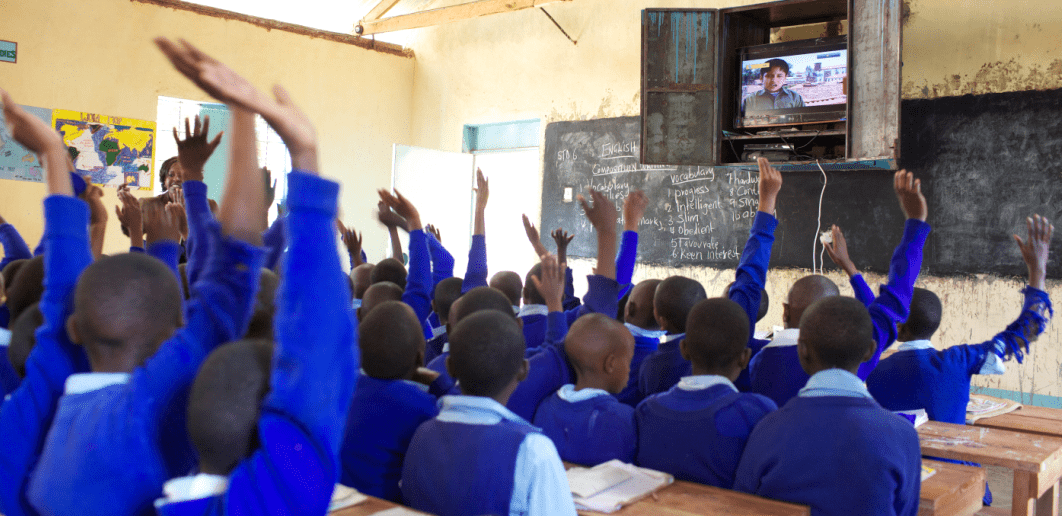Photo: Students engaged through video at a DCGEP Learning Centre at Mung’ala Primary School in Machakos, Kenya © Discovery Channel Global Education Partnership
Tamela Noboa, special advisor to the executive chairman of Discovery Communications, answered MIPBlog’s questions ahead of her company’s president & CEO David Zaslav’s speaking at the the UN Global Education First Initiative launch event at MIPTV, April 10.
Discovery has indeed been furthering the cause of global education for the past 15 years with its non-profit Global Education Partnership, which sets up Learning Centres in underprivileged countries, complete with equipment, educators and tailor-made video programming. The programme has benefitted a million children to date.
Discovery is as such well placed to help kick off the UN Global Education First Initiative, which aims to ensure every child in the world has a place in school by 2015. Read on to find out more…
MIPBlog: Discovery Communications’ Global Education Partnership (DCGEP) was started in 1997. Why?
Tamela Noboa: Discovery Communications is committed to reaching people in every corner of the globe with the opportunity to explore their world and satisfy their curiosity.
Fifteen years ago, when we launched Discovery Channel in Africa, Discovery also launched the non-profit, DCGEP, to extend its mission in some of the world’s most under-resourced schools and communities.
Discovery has made a long-term commitment to this effort, donating both cash and in-kind annually to DCGEP.
> What have its key milestones been since?
Through DCGEP we have launched Learning Centres in schools in 16 countries: bringing locally sustainable equipment, extensive teacher training, and video programming created in collaboration with local educators and mapped to local curricula.
Last year DCGEP touched its 1 millionth student and we hope to double that number in the next 3 years. In 2012, DCGEP also launched Inside Story, a scripted feature film designed to entertain while also educating audiences about the science of HIV. The film is now being broadcast across sub-Saharan Africa on free-to-air and pay channels and we are almost a third of the way to our goal of making the film available to 300 million people.
So through this non-profit, we’re not just using media to illustrate the problems in education and international development, but using media as a tool to solve these problems.
> What are the key benefits for children who see this content?
Our work in schools has shown significant impact in three areas: increased student learning, increased teacher effectiveness and increased community involvement in schools. To put it simply, we are bringing more students into school and making sure they are learning when they get there. And of course, teachers and parents are important in that effort. So it’s not just about great programming, but building teacher capacity and parent engagement in school.
Dropouts, particularly girls, are coming back into schools where we work; teacher attendance (a chronic problem in many areas) is up; and student attendance is up – dramatically in many cases.
> What will DCGEP’s exact role be within the UN’s Global Education First initiative?
Discovery’s support of Education First is natural as our goals, and the results we have achieved through DCGEP, are fully aligned with the goals of Education First. In response to the UN Secretary General launching Education First, the private sector has established the Global Business Coalition for Education (GBC-Ed). Discovery Communications is a founding member, and our chairman and founder, John Hendricks, serves on the board of GBC-Ed. Discovery’s work improving education among marginalised communities is a great example of private sector innovation in the global education space.
Education First is a rallying cry around which like-minded partners can collaborate, innovate, and establish new public and private sector partnerships to support the global education goals.
> How will DCGEP evolve in the near future?
DCGEP is scaling up, and is in talks with several ministries of education about expanding nationwide. The nonprofit is also looking at new mass media opportunities to affect change at a massive scale like they’ve done with the HIV film, Inside Story. Discovery will continue to support these efforts and seek partners that share our vision for using the power of media to transform education.
> What could be first steps for other TV companies looking to use their content to help marginalised students and communities?
Start with your mission and build from your core competencies. We would be delighted to expand on and build new public and private sector partnerships in support of the work we are doing through DCGEP. This effort is about helping communities raise the bar for education, and we all have a role to play.
> Finally, how does this work help Discovery’s business, especially its education business, if at all?
A better-educated individual means better health, increased earnings, more civic engagement – all of which are good for the individual, the family, the country and… good for business. It’s a win, win, win proposition. As a mission driven company we want to extend ourselves into communities that may not yet be able to afford pay-TV.
More about DCGEP on its website, and Facebook page; full details of the UN Global Education First Initiative launch event at MIPTV here; and have your say in how the TV industry could help global education here, by answering our Quora question!





2 Comments
Pingback: Interview with Gordon Brown: “Education is a Silent Emergency” | | MIPBlogMIPBlog
Pingback: Liveblog: United Nations Global Education First | | MIPBlogMIPBlog